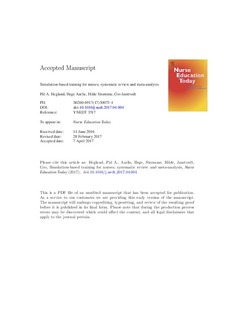| dc.contributor.author | Hegland, Pål André | |
| dc.contributor.author | Aarlie, Hege | |
| dc.contributor.author | Strømme, Hilde | |
| dc.contributor.author | Jamtvedt, Gro | |
| dc.date.accessioned | 2019-03-12T07:57:21Z | |
| dc.date.available | 2019-03-12T07:57:21Z | |
| dc.date.created | 2017-04-24T10:55:27Z | |
| dc.date.issued | 2017 | |
| dc.identifier.citation | Hegland, P. A., Aarlie, H., Strømme, H., & Jamtvedt, G. (2017). Simulation-based training for nurses: Systematic review and meta-analysis. Nurse Education Today, 54, 6-20. | nb_NO |
| dc.identifier.issn | 0260-6917 | |
| dc.identifier.uri | http://hdl.handle.net/11250/2589644 | |
| dc.description | Accepted author manuscript version (post-print). | nb_NO |
| dc.description.abstract | Background
Simulation-based training is a widespread strategy to improve health-care quality. However, its effect on registered nurses has previously not been established in systematic reviews. The aim of this systematic review is to evaluate effect of simulation-based training on nurses' skills and knowledge.
Methods
We searched CDSR, DARE, HTA, CENTRAL, CINAHL, MEDLINE, Embase, ERIC, and SveMed + for randomised controlled trials (RCT) evaluating effect of simulation-based training among nurses. Searches were completed in December 2016. Two reviewers independently screened abstracts and full-text, extracted data, and assessed risk of bias. We compared simulation-based training to other learning strategies, high-fidelity simulation to other simulation strategies, and different organisation of simulation training. Data were analysed through meta-analysis and narrative syntheses. GRADE was used to assess the quality of evidence.
Results
Fifteen RCTs met the inclusion criteria. For the comparison of simulation-based training to other learning strategies on nurses' skills, six studies in the meta-analysis showed a significant, but small effect in favour of simulation (SMD − 1.09, CI − 1.72 to − 0.47). There was large heterogeneity (I2 85%). For the other comparisons, there was large between-study variation in results. The quality of evidence for all comparisons was graded as low.
Conclusion
The effect of simulation-based training varies substantially between studies. Our meta-analysis showed a significant effect of simulation training compared to other learning strategies, but the quality of evidence was low indicating uncertainty. Other comparisons showed inconsistency in results. Based on our findings simulation training appears to be an effective strategy to improve nurses' skills, but further good-quality RCTs with adequate sample sizes are needed. | nb_NO |
| dc.language.iso | eng | nb_NO |
| dc.publisher | Elsevier | nb_NO |
| dc.rights | Attribution-NonCommercial-NoDerivatives 4.0 Internasjonal | * |
| dc.rights.uri | http://creativecommons.org/licenses/by-nc-nd/4.0/deed.no | * |
| dc.subject | simulation | nb_NO |
| dc.subject | clinical competence | nb_NO |
| dc.subject | quality improvement | nb_NO |
| dc.subject | systematic review | nb_NO |
| dc.subject | skills | nb_NO |
| dc.subject | knowledge | nb_NO |
| dc.title | Simulation-based training for nurses: systematic review and meta-analysis | nb_NO |
| dc.type | Journal article | nb_NO |
| dc.type | Peer reviewed | nb_NO |
| dc.description.version | acceptedVersion | nb_NO |
| dc.rights.holder | © 2017. | nb_NO |
| dc.subject.nsi | VDP::Medisinske Fag: 700::Helsefag: 800::Sykepleievitenskap: 808 | nb_NO |
| dc.source.pagenumber | 6-20 | nb_NO |
| dc.source.volume | 54 | nb_NO |
| dc.source.journal | Nurse Education Today | nb_NO |
| dc.identifier.doi | 10.1016/j.nedt.2017.04.004 | |
| dc.identifier.cristin | 1466168 | |
| cristin.unitcode | 203,11,1,0 | |
| cristin.unitcode | 203,11,12,0 | |
| cristin.unitname | Institutt for helse- og omsorgsvitskap | |
| cristin.unitname | Senter for kunnskapsbasert praksis | |
| cristin.ispublished | true | |
| cristin.fulltext | original | |
| cristin.fulltext | postprint | |
| cristin.qualitycode | 1 | |

